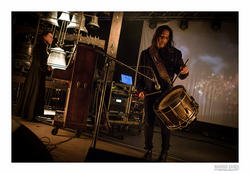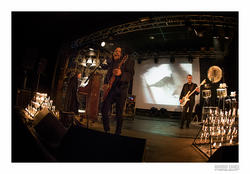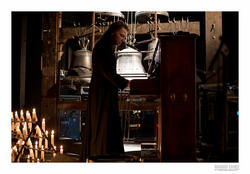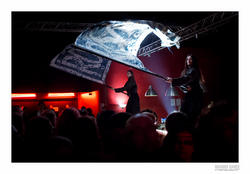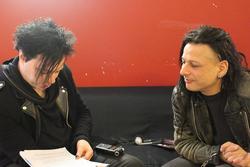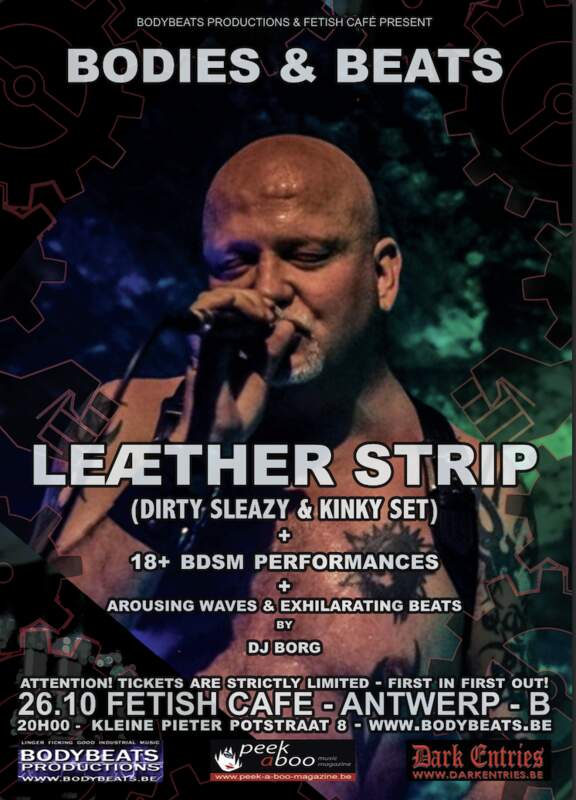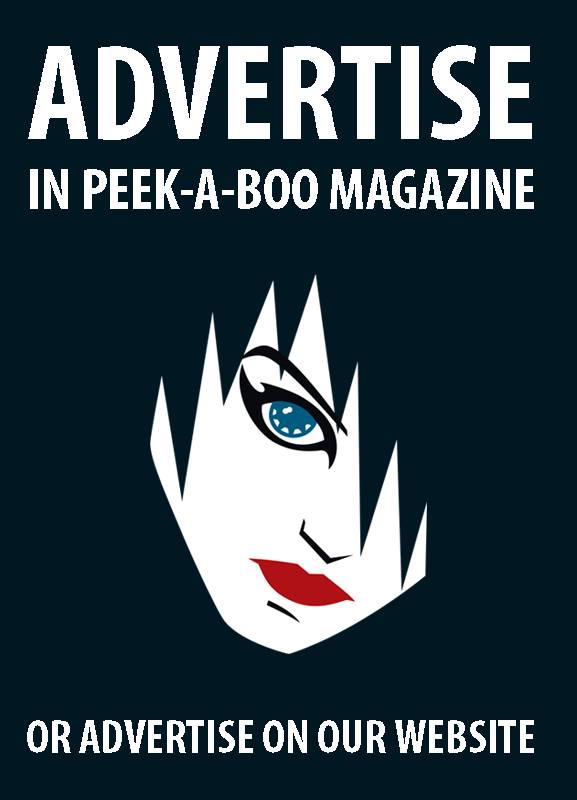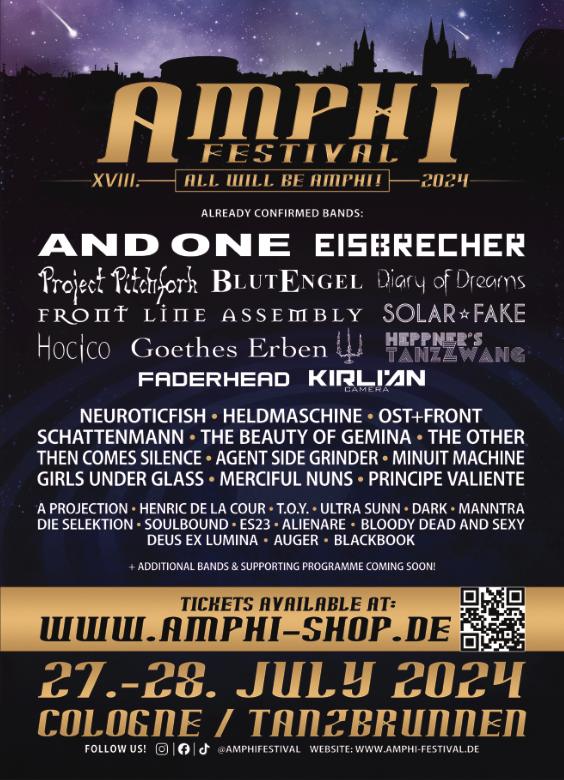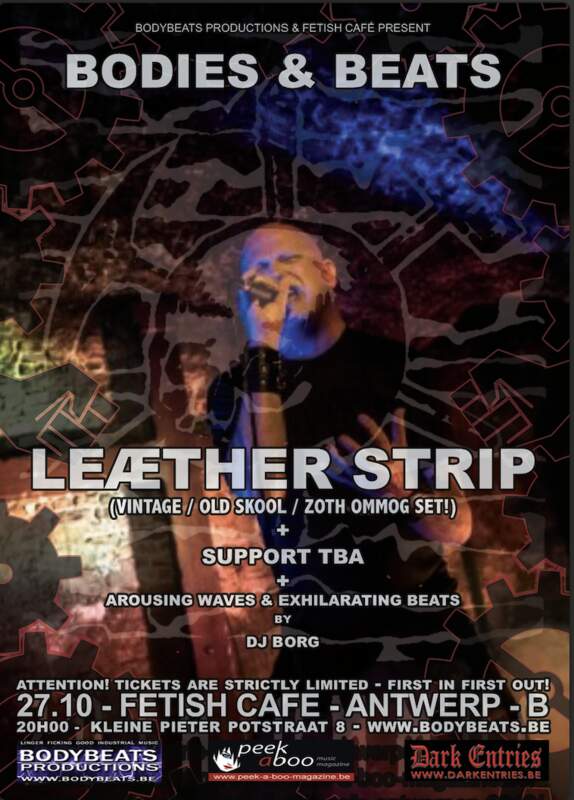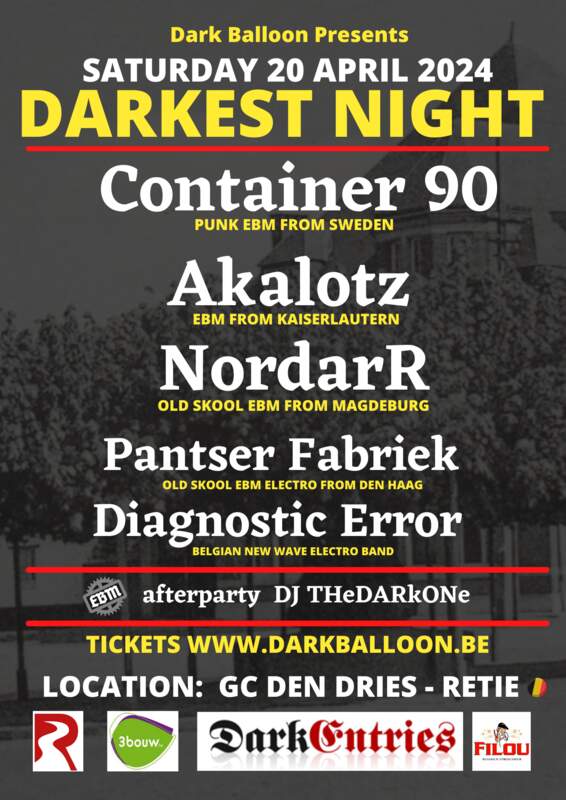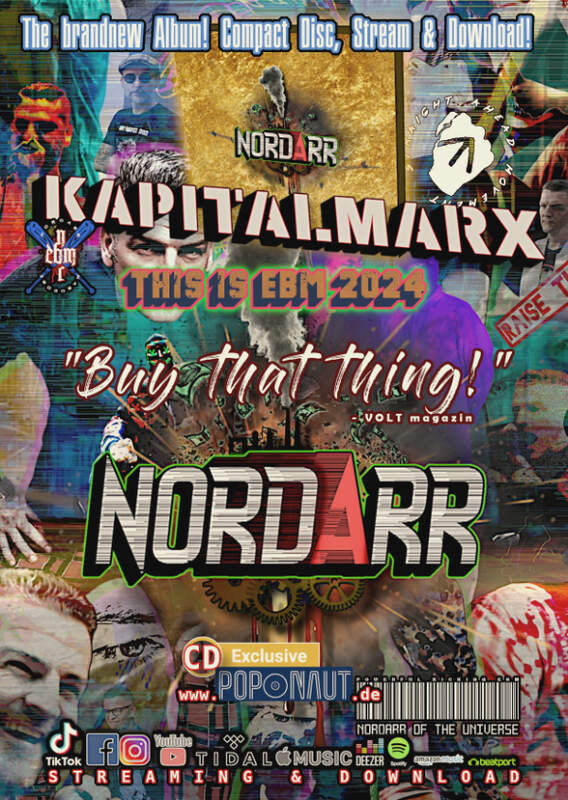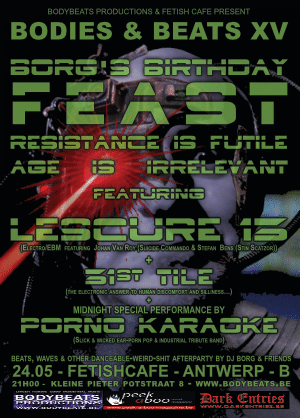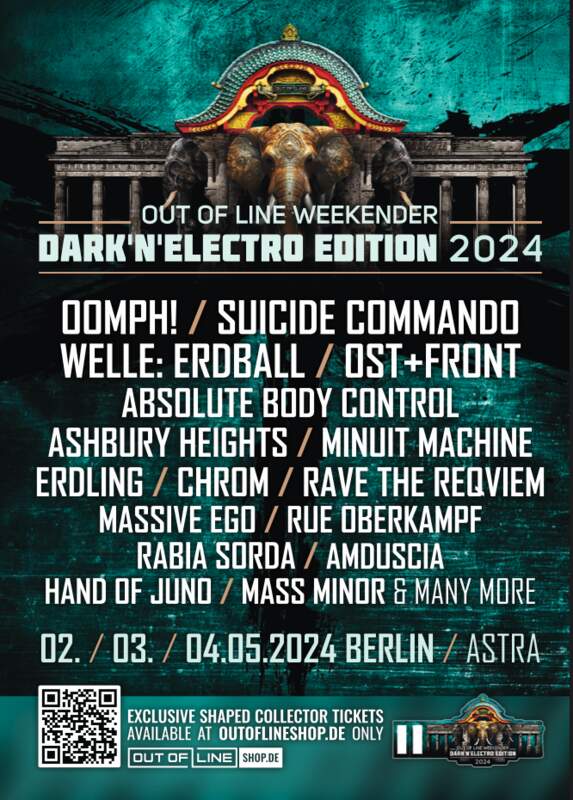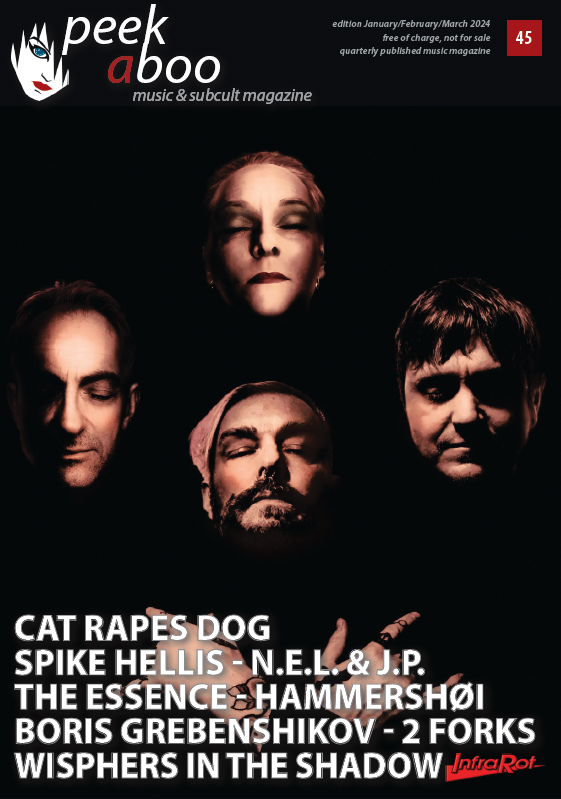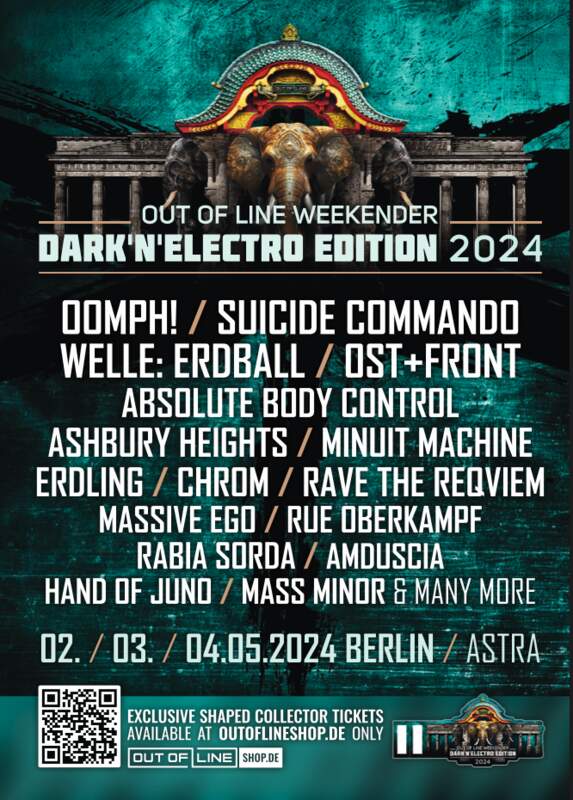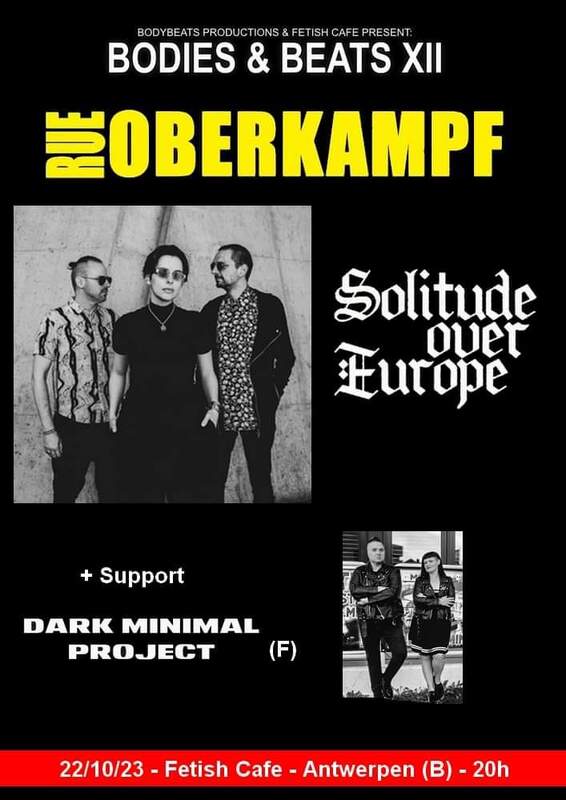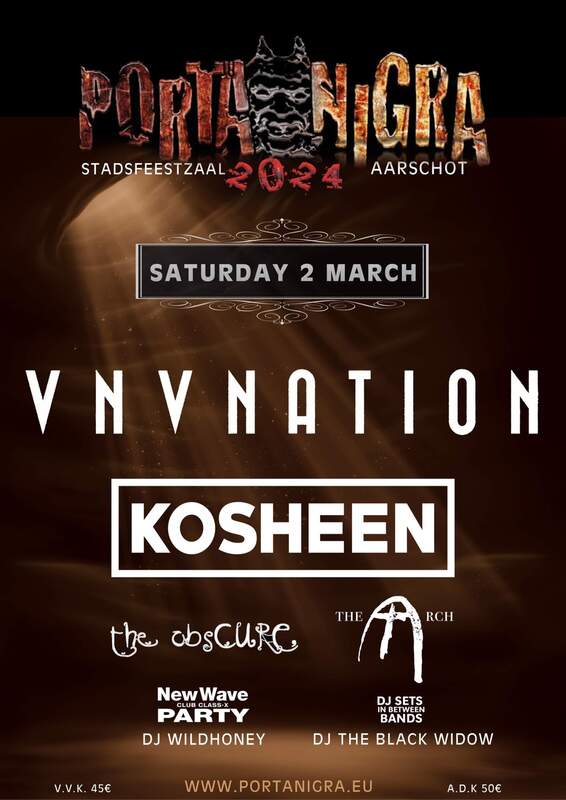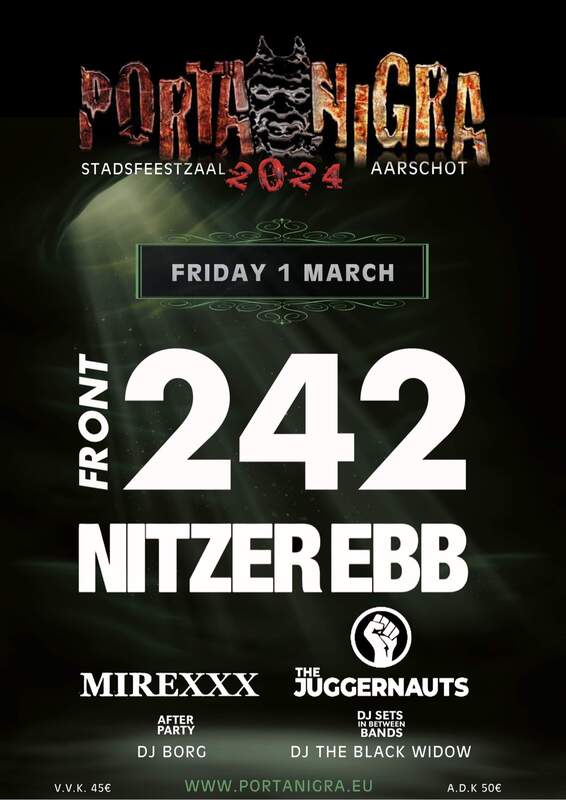
ROSA CRUX
It is a passion for witchcraft that made me want to start this project.
06/04/2015, Xavier KRUTH
photos: © Marquis(pi)X (except the last picture: Lioubov Melantchouk)
An interview with Rosa Crux is a bit like a journey through time. Olivier Tarabo experienced the gothic since the early 80s and talks - as you can expect from a Frenchman - extensively about it. Moreover, he has a very idiosyncratic view of things, about the crisis in the music world and the concept of self-management. The band doesn’t lack originality and creativity, but don’t expect any CDs from it anymore. Olivier explains why.
Thank you, Olivier, to do this interview with us. Rosa Crux... you are from Rouen. And I think Rouen - particularly the Ecole des Beaux-Arts, where you studied and which is situated in an ancient ossuary infused with references to death and religion - has had a big influence on you and what you do with Rosa Crux.
Indeed. Each band has its own personality, its influences, its monuments... The fact that we have studied for five years in this ancient ossuary... It was an environment, it was an old atrium, a sort of big square of more than hundred meters long, completely surrounded by mortuary sculptures. This is not even a place where there is a facade. It is completely caught in a kind of courtyard. It looks like a monastery. It is a place of isolation and an ancient mass grave. Thousands of plague victims are buried in the ground. Originally, it was a big hole where they threw the victims of the plague. I took one of the images of the building to make the logo of Rosa Crux. The skull with crossed tibias and the white cloth... When you see bones combined with a white cloth, it means: the plague. It was the symbol of the plague, and by analogy I like the relationship between the goth scene and the plague, because they both have this aspect of being outcasts, rejected beings.
And what exactly did you study at the Ecole des Beaux-Arts?
An art training in France lasts for five years. The first two years you learn a little of everything. It's very classic. Drawing, painting, sculpture, modelling, all subjects. I've always been more focused on volume, on objects. So yes, I have done a lot of painting and drawing, even though I didn’t particularly love it. My main speciality was volume or sculpture. I specialized in castings. I loved to make molds. I started making molds of skulls to practice. I have a specialization in duplication and high-tech forms and in all you find metal: metal construction, sculptures... It gave me the Jeux de fers (iron plays) afterwards.
Yes, indeed. We can see the influence of all these things in what you do with Rosa Crux. But was there also a musical component in your studies?
I started at the school of fine arts in 1982 or 1983. I was still a minor. I was sixteen and a half and I was in my second year in this picturesque location in Rouen, where we got regular visits of almost all the underground bands that came to the city. It was kind of the first group of early goths in France.
Right, you spoke of Rouen as the gateway to the whole new wave/post-punk culture from England to the continent...
Right, because everything that happened in England passed through Rouen via English and fine arts students who went to school exchanges. We had to do a year in a partner school and our partner school was in London. Each student left and returned with the latest fashion in London, and with the music of course. People brought discs and clothes and everything with them. I think we were the first in Rouen. We only heard about goths in Paris a year later. There really was a small group of committed people that were very connected. And above all, we had two labels in the region. There was a label called Sordide Sentimental, which is still known, that issued an LP of Joy Division and made us discover Psychic TV, and another label called Invitation au Suicide that included Rozz Williams and Virgin Prunes. These people were often in Rouen to work, for instance to record new things. I remember that we had the Virgin Prunes for three days with us. One day I was in the studio working and someone called me: ‘Hey, there's somebody in the square. He seems to be playing the star. We do not know who he is. His name is Rozz or something’. It proved to be Rozz Williams. It was pretty funny, these people were stars a little later. People came to visit the ossuary and make pictures. There are quite famous pictures of the Virgin Prunes taken in our school. When one is attracted to the dark and morbid, this is perhaps one of the most beautiful places in France. It has the atmosphere of a cemetery. We are in 1983, we have two labels that produce bands and we had a concert room where they did their first tests for performances. I remember a concert of Virgin Prunes. We were 22 in the room! The first band was Persona Non Grata. Afterwards we got bigger names.
That was 1983. You began in 1984...
I had known Claude - who plays keys - for a few years. We met at the academy. We both wanted to make music. We talked about it, we were looking for opportunities, but we didn’t find a name and the motivation to establish a really serious project until '84, or maybe the end of '83. And then we needed a few years of work before anything came out, in '86, I believe.
In fact, you've pretty much experienced the wave/goth scene from the beginning. Which evolution do you perceive?
Your question already contains a view of evolution. Because for us, the new wave - without being rude - was quite the popular thing. Bands like Depeche Mode, The Cure... We were not interested in these bands at that stage. The proto-gothic post-punk scene was really wild. New Wave was posh, something for nightclubs...
But if you talk to many artists from that period, they say that there was still no mention of gothic. It used to be called new wave or post-punk. That’s the reason why I say new wave, goth...
That is true. The ‘gothic’ word did not exist. It came very late, ten years later. And we were very amused because no one could give a name to this movement. Yet it existed, it was clear... A group like the Stranglers - with the song ‘We Are The Men In Black’ - was more interesting to us than the whole new wave or The Cure at that time. The Cure was already doing really light things. They would come back to their early sound much later. Robert Smith was interesting because he played with Siouxsie And The Banshees, but not as The Cure... We do not even talk about electro back then, that did not exist. There was something much wilder. It was brutal, very violent, a little industrial. We were allready interested in the Neubauten, even though they were still experimenting in basements and doing very bizarre things. The second period was a backlash from the heyday of techno. I remember a time when people left the gothic scene and went to Technivals in goth look. They came back later with this type of boom-boom music that I personally can not stand, but all right... (laughs).
Then we come to your own style, the ‘dark ritual’. That is actually a mix of many things. There are obviously post-punk influences and a little batcave - guitars and tribal drums - and then there is the more classical side: medieval, liturgical and even contemporary music...
In fact, the band I feel the most connected with are the Virgin Prunes, because they have their own style, this ritual side, tribal too, totally free because they do not care whether people like them or not. And they had a special relationship with religion. They had their own religion, a kind of proto-paganism. But I only found the name ‘dark ritual’ much later, because it is always good to have a term that gives a hint to the content. I didn’t want the term ‘Batcave’, and the term ‘gothic’ also became so wide gradually that it meant both EBM and completely different things. The same goes for post-punk. Take a band like Radiohead, that’s post-punk. They play covers of Joy Division...
Everybody plays covers of Joy Division... (laughs)
I mean... U2 is also post-punk. It is too vague. We talk about batcave, but were the Virgin Prunes batcave? Those terms are too complicated.
You should not necessarily put a label on everything.
But I like the name 'dark', which fits in anywhere. We spoke of ‘dark wave’ rather than ‘new wave’, even if people described themselves as ‘new wave’ at the very beginning. It was the only name that was true. But it also had a ‘nouvelle vague’ side, as in the French films of Godin. Besides, I think the ‘nouvelle vague’ had a very direct relationship with bands like Cocteau Twins: they indirectly said they were the doubles of Cocteau. And it was a trip that stemmed directly from the new wave of French cinema. The English are big fans of Godin, much more than the French.
Let us talk about the concept of self-management, which is very dear to you. Why do you attach so much importance to it?
Initially, like many other bands, we wanted to find a record label and sign with them. There were Sordide Sentimental and Invitation au Suicide in our district. However, they offered packages that were so difficult that the groups themselves could not recognise themselves in it. It was good for people who hoped to make a great career. Rozz Williams for example was a very ambitious project. For bands a little more wild, like us, it was more difficult. We almost had our first record made by Sordide Sentimental, but we have dropped it right away. A little wild, a bit cheeky, I admit, but we realized very quickly that the contract they offered us would not enable us to have a little income. We would not be be able to live or to have a steady income from our music, but Rosa is a project with a lot of costs too. There are many sculptures, inventions that need to be worked out. So some resources are needed. It was better to remain independent than to sign to a record label that would not have given us enough funds. I made the mistake much later, in 2008, by signing with Trisol for a DVD. It was kind of a disappointment because they have sold 2.000 copies of the DVD in three months - that's a lot, we have never sold so much at once - but we got almost nothing in return. They said they would reprint it. I brought them our new album and then I realized that we would receive nothing from this new album either. Maybe we were going to make a little profit on a reissue. Record companies are really struggling to make ends meet, and they use the artists for that. Besides, they are also beginning to sell T-shirts and all the rest. That’s a disaster. Anyway - as I've said in several interviews - the album is dead! It really is something that no longer exists. Of course it still exists, but it's more of a habit, a convention. Technically, it is almost absurd to start a band today and to want to make your own albums. Many people do it and will do it for some time. I have no real solution.
I just wanted to ask: what is your alternative?
The alternative that we have at this moment... we work with USB. In our starting days - I don’t know if you remember - everyone worked with cassettes. Fanzines were often accompanied by compilations on cassette.
It’s coming back. If you go to Wool-e-shop, here at this festival... that man has his own cassette label.
Okay, but you will have to admit that cassettes have a very poor quality. If you copy it three times, you lose a lot of sound quality. For me, the tape of today is the USB stick. I believe very strongly in the USB. Anyone can duplicate at home, and nothing gets lost. A good tape back then was the same price as a USB stick today. Our first production was a cassette. We released it through a fanzine called ‘On a faim’ in Rouen. Really all the fanzines had compilations on tape, it was very common.
What was the name of the fanzine?
On a faim (we’re hungry). It was an anarchist fanzine, based on an old photograph of unemployed men who were holding a banner with the inscription: we are hungry. Initially, it was a fanzine of the anarchist federation, but the man who issued it was a big music lover, so he created a magazine that wrote both about anarchist ideas and about music. Anyway, the punks have always been close to the anarchist ideas. He produced many bands. We first did a cassette and then a single with him.
But you now release a box with three CDs. Or is it a USB?
It is a box with three CDs, because we have issued three albums in CD format. We simply decided to stop behaving like there is no problem. We no longer sell them in record stores. The FNAC in Rouen, for instance, has stopped the sale of CDs. No records department, it's over. Virgin went bankrupt in France. The CD does not sell anymore. So we release it as a collector. It’s still released, but in this kind of box.
And you sell it at concerts and online...
It can be ordered on our website. The site has a shop that works very well, and there are a lot of orders. Though we do not work with a stock. I wait until we have five orders, and then we make a small series. It is intended to satisfy a specific demand. And therefore, it is best to do it in self-management, because we are not obliged to make large quantities. It is a part of the advantages that the tapes had as well. When you need thirty, you just make thirty and that’s it. Self-management gives you a lot of freedom.
And are this real CDs or CD-Rs?
They are real CDs. We make them per hundred. The same forms that we sold earlier in FNAC. But it is true that we do not want to make a fourth album that way.
You said that you have three albums ready in the drawer at home.
That's right, but we are not going to issue them in the form of CD albums.
Will you issue them? What are your plans?
Yes, we are working on a series called Reliquae. The first issue tackled the subject of the dance of the earth, because that was in demand. Each issue gets a theme. First we took the titles that are linked to the dance of the earth, it is a bit of a reissue of course. We also have some films. The second - about the theme of rats - has just been released. The third, which comes in a month or two, includes two previously unreleased tracks. We are currently recording them. I think we're going to make it a picture disc. So we go back to the principle of the single, the 45 rpm.
Only as a collector?
A collector, but not as a limited edition. If there is a strong demand, we will meet that demand, and at a price that is reasonable. Between 15 and 20 euros, the price of an LP. Of course it is true that there are only two titles on it, but there’s the whole object. We put a lot of work into the object, because that fits well with the image of the band.
But you no longer think in terms of an album: a collection of songs - 10 or 12 - on one disc. Have you given up on this concept?
We have not given up. We will do that, but in that case it will rather be a recording of a live concert. We may one day be filming a full performance, to make something whit image and sound, and you will have 20-30 songs together. But the concept album... You have to remember the history of discs. You had the single at 45 rpm first. The LPs at 33 rpm were more a kind of compilation of singles. You can take many groups - The Cure suits well, because it is a great machine that works well - who released everything as singles. They even brought out an album with all the b-sides and so on. In history, the record was a compilation of small compositions. Why we don’t want to release 12 or 15 songs at once? Because today, as everyone knows, you can already download them two hours later. You do not need to conform to a conventional format that is no longer suitable. It is through adaptation that you can survive. Those who do not adapt will die. It is a way for us to survive without boasting and dying behind the scenes. Boasting… we have done enough of that. We have three albums. I can understand it for a band that never released a record. It is important to have a record. The real problem is the downloads. Everybody knows that.
We talked about the concept of self-management. I also wanted to talk about self-managed concerts. You have a concept with a truck speed with which you would tour...
This is a major project that is underway. You should know that the truck was bought merely 6 months ago. The problem is that we need much time to establish ourselves on stage. It takes time, it is hard work. Unfortunately, we have an image - as many goth groups - which is not very popular, which does not fall into the flavor of the moment. It is therefore difficult to be programmed by non-goths. And we absolutely need to play more. We do goth festivals, but it's too punctual. To be a little more independent, we said that we had to organize our own concerts. And we wanted to look at other things than always playing in a concert room. There are so many beautiful places outside. The idea of playing surrounded by old stones and beautiful monuments fits us well. So we went to buy a truck to play at some unusual places and locations. We organized a kind of crowdfunding, which went relatively smoothly. We collected almost 6,000 euros. We could buy a truck that was big enough to put on this project. There was a first attempt last year in a castle - known for the ritual dark nights that take place in open air - and there were surprises. The first big surprise was the dew. It was quite unexpected. Everything was set up and we did not take into account that at two or three o'clock in the morning - no matter whether the weather is good or bad - the dew will rise and cover all equipment, speakers, piano’s, instruments... We found everything covered with a layer of water. It was a great lesson. We stopped everything and we are now working on adjustments to improve the project. The next time, we will have a covered stage, or a semi-covered stage. Next big test: August 1! (See later).
You sing in Latin. You once said that you did not want the content of the lyrics to obscure the music, or even to destroy the music. I have a slightly different opinion about that. I think that music and lyrics can be mutually reinforcing.
Of course. It's a very personal choice. You must know that the great theme of Rosa, at the base, was witchcraft. This is a very important point to understand. It is a passion for witchcraft that made me want to start this project. I have made a research topic of it as a freshman in college. I made some ancient parchments. In short, I was completely fascinated by the subject. And with Claude we wanted to convert the old witchcraft texts that I had found in music and songs. It was almost a longing for reconstitution, because I found things that seemed very much like lyrics. There were phrases that were repeated five to ten times, and it seemed to be sung. The first test was the part that we play today with the dance of the earth: Eli Elo. This is a really ancient text. I had been fascinated by the text. Writing lyrics myself seemed too small in comparison to using texts for which people have been burned, texts that had a very strong story. We have subsequently maintained this principle. All texts used in Rosa are cursed texts. I need to feel scared. The bond with the text - I must agree with you - is very strong and very important. I need to be fascinated and almost afraid to do what I do.
So there is a selection of the lyrics...
Yes, the texts are chosen. It can be very brief, a saying... In general, witchcraft is the theme, sometimes in the guise of disgraced monks. All the witch trials were transcribed in Latin. Most of what I have found is in Latin. But there are also a number of texts taken from the Kabbalah, in ancient Hebrew.
You also sing in Hebrew?
These are not songs in Hebrew. These are the names of demons. Take Astaroth, Behemoth... they are actually Hebrew names. Witches took pleasure in taunting religion. I had a book on witchcraft satting that Behemoth - that everybody knows - was a sort of anagram of Mohamed. Blasphemy was the best way to provoke religion at the time of the witches. It is something that was later included in the Gothic culture also, but it comes from the blasphemers. The famous Baphomet of the Templars is a mixture of blasphemy and Mohamed. It was not the attraction of Islam. It was simply the desire to provoke the Church and to do blasphemy. That is the history of witchcraft. And I come back to the Virgin Prunes, playing with the whole myth of Ireland. They have developed their own type of paganism. They carried black masses, in a way. Rosa has that aspect too, hence my name of dark ritual. Dark ritual is actually a black mass.
The core of Rosa Crux includes Claude Feeny and you, but you also said that there is a whole team involved in the project. How many are you in total and what are the tasks to be divided?
You saw a bit of the installation with which we play... there are a lot of things. When we go out to play, we’re usually five or six. There are three musicians. We also have a bass player. We work with Mickael who accompanies us now for almost two and a half years. It works very well. I hope we will integrate him into the band for the rest of our days. And then there is the performance itself, a lot of heavy things, the bells, the carillon that we need to build up. We always have someone who comes to lend a hand, which is very important. Then we have two performers. And the automatic battery is actually an invisible fourth musician, so in a way, we still have a kind of drummer.
No choir, this time?
No. The choir is not touring and I do not think I will ever do it again. The choir has exhausted me a bit. It existed for about six or seven years, I do not remember well. But I had the same problem that all choirs in the world have, which is that people in a choir come and go. They join, stay a bit, some leave, others arrive... And we have a way of singing that is very special, so we don’t fall into the cliché of Latin. It took too much work to learn everything anew to new people. And then one day I said: it is enough.
Maybe we can finish here. We give you the last word.
The last word… In the Do It Yourself philosophy there is a big event that we do every year: les nuits dark ritual. It is the fifth edition and it is not far from Belgium, in a castle near Amiens. From the border you have to drive about an hour and a half. From Brussels or Antwerp, it will be something more, but it is not very far by car. It's a huge castle in Normandy where we are completely free. The owner of the castle is a friend. We got to know him during diving lessons and he is also the mayor of the village. He really gives us carte blanche. We went to the castle and we discovered a crypt which we excavated and restored, and where we do exhibitions. And then there's a lot of open-air events... installations, fire sculptures, outdoor concerts... There are many booths. And we install more and more performances and machines in the park each year. The fifth nuit dark ritual takes place on August 1 in this castle in Thoix and we have invited Matt Sieben to play with us. You should visit the website for complete details. It is the Rosa event you should not miss. This is the occasion when we show ourselves from our most complete side.
Xavier KRUTH
06/04/2015
Next interviews
CUSTOMS • We definitely have a lot of New Wave influences in our music.
HOCICO • A violent storm approaches the world - Hocico about the ongoing tour, the new single and their music in space
MARSHEAUX • A glance at their secret garden
COALESCAREMONIUM • The main goal behind Coalescaremonium is to bring people from a gothic scene that fragmented up into many little subcultures together for one grand celebration in a nice location.
THE PSYCHIC FORCE • We are still walking!
SCHWARZBLUT • Every show is different, so we are very curious what the public Coalescaremonium will make of it that evening.
ARBEID ADELT! • May I now finally mouth your girlfriend or what?
GRAUSAME TOCHTER • I am much too emotional and restless to limit my creativity by sticking to just one style
IRIS DIVINE • I would describe our sound as a vast collection of both individual and group-fed influences that range from Rush to Deftones to Trifonic to Sepultura to Taylor Swift.
GNY • We bring old Nordic folk songs with pagan origin back to life!


